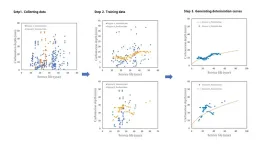(Press-News.org) PROVIDENCE, R.I. [Brown University] — Three years into the COVID-19 pandemic, new variant outbreaks continue to fuel economic disruptions and hospitalizations across the globe. Effective therapies remain unavailable in much of the world, and circulating variants have rendered monoclonal antibody treatments ineffective. But a new analysis shows how convalescent plasma can be used as an effective and low-cost treatment both during the COVID-19 pandemic and in the inevitable pandemics of the future.
In a study published in Clinical Infectious Diseases, an international team of researchers analyzed clinical data and concluded that among outpatients with COVID-19, antibodies to SARS-CoV-2 given early and in high dose reduced the risk of hospitalization.
“If the results of this meta-analysis had somehow been available in March of 2020, then I am certain that millions of lives would have been saved around the world,” said study author Dr. Adam C. Levine, a professor of emergency medicine at Brown University’s Warren Alpert Medical School.
While several other early treatments for COVID-19 have had similar results, including antivirals like Paxlovid and monoclonal antibodies, only convalescent plasma, the researchers concluded, is likely to be both available and affordable for the majority of the world’s population both now and early in the next viral pandemic.
“These findings will be helpful for this pandemic, especially in places like China, India and other parts of the world that lack access to antiviral medications like Paxlovid,” Levine said. “And because it provides information on how to more effectively use convalescent plasma as a therapy, this will be even more helpful in the next pandemic. This study is essentially a roadmap for how to do this right the next time.”
Blood plasma from people who have recovered from COVID-19 and contains antibodies against SARS-CoV-2 was used as a treatment early in the pandemic, Levine said — months before monoclonal antibody treatment or vaccines became available, and more than a year before an effective oral drug therapy was clinically available.
Although convalescent plasma seemed promising, outpatient research was limited, and studies that did exist showed mixed results. One problem was that most studies were conducted in patients already hospitalized with COVID-19, Levine said, largely due to the convenience of conducting research with this population. The objective in the new study was to review all available randomized controlled trials of convalescent plasma in non-hospitalized adults with COVID-19 to determine whether early treatment can reduce the risk of hospitalization.
The analysis included data from five studies conducted in four countries, including Argentina, the Netherlands, Spain, and two in the United States. Levine previously supervised enrollment at Rhode Island Hospital in a clinical trial led by Johns Hopkins Medicine and Johns Hopkins Bloomberg School of Public Health. Across the five studies, a total of 2,620 adult patients had received transfusions of convalescent plasma from January 2020 to September 2022. The researchers conducted an individual participant data meta-analysis to assess how the transfusion timing and dose impacted the patient’s risk of hospitalization during the 28 days after infection.
In their analysis, the researchers found that 160 (12.2%) of 1,315 control patients were hospitalized compared with 111 (8.5%) of 1,305 patients treated with COVID-19 convalescent plasma — 30% fewer hospitalizations.
Notably, the strongest effects were seen in patients treated both early in the illness and with plasma with high levels of antibodies. In these patients, the reduction in hospitalization was over 50%.
For future pandemics, the goal is to use plasma from donors who have high levels of antibodies, said corresponding study author Dr. David J. Sullivan, a professor of molecular microbiology and immunology at Johns Hopkins Bloomberg School of Public Health and School of Medicine. “This research suggests that we have been underdosing convalescent plasma for many previous pathogens, which impacts effectiveness,” Sullivan said. “It bears repeating: Early and high levels of antibodies increased the beneficial efficacy.”
Levine explained that because convalescent plasma was the only treatment available at the beginning of the pandemic, it was used widely — and often incorrectly, on hospitalized patients who were already experiencing severe symptoms late in the course of COVID-19. Those symptoms were due to a ramped-up immune response to the virus, not the virus itself, Levine explained.
“By the time the patient was at the point where they’d reached the inflammatory phase that caused severe symptoms, it was too late for treatments like convalescent plasma or even monoclonal antibodies to work,” he said.
What is now known is that convalescent plasma works best when given early in the course of illness. That’s when it can neutralize the virus and get ahead of the body mounting an intense immune response, thereby preventing hospitalization and death, Levine said.
The five drug treatment trials in the analysis took place at a variety of global health care sites, he noted, including nursing homes, outpatient clinics and emergency departments. The diversity across the studies is a sign that the data is likely generalizable to many other types of populations and settings around the world, said Levine, who also directs the Center for Human Rights and Humanitarian Studies at the Watson Institute for International and Public Affairs at Brown.
Levine cited another recently published study in JAMA Network Open that showed that convalescent plasma is effective in reducing mortality in immunocompromised patients. This new meta-analysis provides evidence that convalescent plasma can also be effective in the larger population of adults who are not immunocompromised.
The U.S. Food and Drug Administration allowed early convalescent plasma use in December 2021 for those patients with COVID-19 who were also immunocompromised, but not yet for patients with COVID-19 who are not immunocompromised. The authors said they hope the new study will push the FDA, and other countries around the world, to make early treatment with COVID-19 convalescent plasma available to a much larger group of patients at risk for hospitalization.
A treatment that evolves with the pandemic
The findings come at a time when monoclonal antibodies, the most commonly used treatment for COVID-19, have been shown to be ineffective against new variants of the virus. In November, the FDA revoked emergency authorization of the last monoclonal antibody treatment because it wasn’t expected to have much of an effect against Omicron sub-variants.
In contrast to monoclonal antibody therapies, Levine said, convalescent plasma donated by patients who have recovered from the virus is a treatment that evolves with the pandemic. Because it has antibodies that attach to multiple different parts of the virus, there are still opportunities to attach to a receptor even after the virus mutates and morphs some of its receptors. It’s also less expensive to produce than pharmaceutical antivirals.
In the first year of the pandemic, Levine said, before the development of vaccines and effective treatments, researchers tried many treatment strategies in order to quickly find something that worked to save lives.
“When the next big pandemic hits, we're going to be in a very similar situation,” Levine said. “Yet at least next time, we’ll have research like this to inform our strategy.”
The study was supported with funding from the U.S. Department of Defense Joint Program Executive Office for Chemical, Biological, Radiological and Nuclear Defense, in collaboration with the Defense Health Agency (W911QY2090012), with additional support from Bloomberg Philanthropies, the State of Maryland and the National Institutes of Health.
In addition to the Brown University and Rhode Island Hospital, researchers from the following institutions participated in this study: Baylor College of Medicine; University of Cincinnati College of Medicine; Johns Hopkins University; Anne Arundel Medical Center; University of Texas Health Science Center; Wayne State University School of Medicine, Michigan; University Medical Center, Rotterdam, The Netherlands; Leiden University Medical Centre, The Netherlands; Fight Infectious Diseases Foundation, Hospital Universitari Germans Trias i Pujol, Badalona, Spain; ISGlobal, Hospital Clínic, Universitat de Barcelona, Spain; Medical University of South Carolina; University of Michigan; University of Colorado School of Medicine; Fundación INFANT, Buenos Aires, Argentina; and Vanderbilt University.
END
Study provides roadmap for using convalescent plasma as an effective COVID-19 treatment
A new analysis shows how convalescent plasma can be used to prevent hospitalizations and ultimately save lives, both for COVID-19 and for the next viral pandemic that inevitably arrives
2023-02-21
ELSE PRESS RELEASES FROM THIS DATE:
Improving access to reproductive health services among youth with intellectual and developmental disabilities
2023-02-21
New York, NY | February 21, 2023 — The National Institutes of Health (NIH) will award $3,906,026 over five years to researchers from the Institute for Implementation Science in Population Health (ISPH) at the CUNY Graduate School of Public Health and Health Policy (CUNY SPH) to test the efficacy of a new socialization and sex education curriculum for young people with intellectual and developmental disabilities.
CUNY SPH Professor Suzanne McDermott and Associate Professor Heidi Jones will test the curriculum in a randomized controlled trial among 856 adolescents ...
Working a four-day week boosts employee wellbeing while preserving productivity, major six-month trial finds
2023-02-21
Sixty-one organisations in the UK committed to a 20% reduction in working hours for all staff, with no fall in wages, for a six-month period starting in June 2022. The vast majority of companies also retained full-time productivity targets.
Now, results from the world’s largest trial of a four-day working week reveal significantly reduced rates of stress and illness in the workforce – with 71% of employees self-reporting lower levels of “burnout”, and 39% saying they were less ...
Prisons and Probation Ombudsman should improve transparency in death investigations to improve prison safety, report finds
2023-02-21
The UK Prisons and Probation Ombudsman (PPO) must improve transparency when investigating prisoner deaths, according to a new report and policy brief by prison safety experts at the University of Nottingham.
The report, written by Dr Sharon Shalev, draws on research led by Dr Philippa Tomczak in the Faculty of Social Sciences, which offers recommendations to the PPO and policymakers for improving prisoner death investigations and promoting change.
Every year, hundreds of prisoners die in England and Wales — in the 12 months to September 2022, there were 307 deaths in prison custody1. These deaths will almost always be ...
How do parents decide if they should vaccinate their kids against SARS-CoV-2?
2023-02-21
For parents, the decision to vaccinate their kids against SARS-CoV-2 is complex, influenced by scientific evidence, political and social pressures, and views about individual versus collective benefits of vaccination, according to a new study published in CMAJ (Canadian Medical Association Journal) https://www.cmaj.ca/lookup/doi/10.1503/cmaj.221401.
Researchers conducted a qualitative study with in-depth interviews of 20 parents to understand their views about SARS-CoV-2 vaccination, with a goal to support future vaccination initiatives.
“Given the ...
Advocacy by LGBTQ+ school clubs may help combat student depression
2023-02-21
Advocacy by student-led Gender-Sexuality Alliance (GSA) clubs could help to reduce school-wide disparities in depressive symptoms between LGBTQ+ and heterosexual students, according to a new study.
The findings, published today in the Journal of Clinical Child and Adolescent Psychology, suggest that schools with GSAs (also known as Gay-Straight Alliances) that engage in more advocacy to highlight issues affecting LGBTQ+ students can help to promote well-being among LGBTQ+ youth across the wider school population.
“Discrimination ...
Does living along the US-Mexico border affect the chances of survival among children with leukemia?
2023-02-21
Residing in border regions was linked with a higher risk of dying within five years among children with acute lymphoblastic leukemia, the most common type of pediatric cancer.
In an analysis of cancer registry data from Texas, children with acute lymphoblastic leukemia (ALL) who lived along the border with Mexico were more likely to die within five years than those living in other areas of the state. The findings are published by Wiley online in CANCER, a peer-reviewed journal of the American Cancer Society.
The ...
New way to predict the damage and aging of bridges by using DNA. technologies
2023-02-21
The Korea Institute of Civil Engineering and Building Technology (KICT, President Kim Byung-Suk) announced that it has developed the D.N.A. (Data, Network, and AI) technologies to predict the levels of damage and aging of bridges for preventive maintenance.
As of 2021, the percentage of Korean bridges aged 30 years or more stands at a relatively low 12.5%. However, this ratio is expected to increase in the next decade to 39.3% by 2031 and rapidly spike up to 76.1% in 20 years. For the preemptive management of these aging bridges, the ...
Gameto licenses Wyss Institute tech to grow human ovaries in the lab
2023-02-21
Despite the fact that we all start out as an egg cell in one of our mother’s ovaries, these human reproductive organs are surprisingly under-studied. Scientists have been working on creating in vitro models of human ovaries so that we can learn more about them and develop treatments for ovarian conditions, but most existing models use a combination of human and mouse cells, which do not faithfully replicate human ovary functions and take a long time to grow in the lab.
Now, researchers at the Wyss Institute for Biologically Inspired Engineering at Harvard University, Harvard Medical School (HMS) and Duke University in collaboration with ...
Robot helps students with learning disabilities stay focused
2023-02-21
Engineering researchers at the University of Waterloo are successfully using a robot to help keep children with learning disabilities focused on their work.
This was one of the key results in a new study that also found both the youngsters and their instructors valued the positive classroom contributions made by the robot.
“There is definitely a great potential for using robots in the public education system,” said Dr. Kerstin Dautenhahn, a professor of electrical and computer engineering. “Overall, the findings imply ...
Most babies born to mothers with COVID-19 separated after birth resulting in low breastfeeding rates
2023-02-21
Most babies born to mothers with COVID-19 were separated after birth resulting in low breastfeeding and skin-to-skin contact rates during the height of the pandemic, according to a new global study.
The international research, led by Murdoch Children’s Research Institute in collaboration with the the European Society of Paediatric and Neonatal Intensive Care (ESPNIC), found that transmission of COVID-19 from mother to baby was rare and generally mild when it occurred. But despite this, almost half of all babies did not receive any breast milk, with ...
LAST 30 PRESS RELEASES:
Bacteria frozen in ancient underground ice cave found to be resistant against 10 modern antibiotics
Rhododendron-derived drugs now made by bacteria
Admissions for child maltreatment decreased during first phase of COVID-19 pandemic, but ICU admissions increased later
Power in motion: transforming energy harvesting with gyroscopes
Ketamine high NOT related to treatment success for people with alcohol problems, study finds
1 in 6 Medicare beneficiaries depend on telehealth for key medical care
Maps can encourage home radon testing in the right settings
Exploring the link between hearing loss and cognitive decline
Machine learning tool can predict serious transplant complications months earlier
Prevalence of over-the-counter and prescription medication use in the US
US child mental health care need, unmet needs, and difficulty accessing services
Incidental rotator cuff abnormalities on magnetic resonance imaging
Sensing local fibers in pancreatic tumors, cancer cells ‘choose’ to either grow or tolerate treatment
Barriers to mental health care leave many children behind, new data cautions
Cancer and inflammation: immunologic interplay, translational advances, and clinical strategies
Bioactive polyphenolic compounds and in vitro anti-degenerative property-based pharmacological propensities of some promising germplasms of Amaranthus hypochondriacus L.
AI-powered companionship: PolyU interfaculty scholar harnesses music and empathetic speech in robots to combat loneliness
Antarctica sits above Earth’s strongest “gravity hole.” Now we know how it got that way
Haircare products made with botanicals protects strands, adds shine
Enhanced pulmonary nodule detection and classification using artificial intelligence on LIDC-IDRI data
Using NBA, study finds that pay differences among top performers can erode cooperation
Korea University, Stanford University, and IESGA launch Water Sustainability Index to combat ESG greenwashing
Molecular glue discovery: large scale instead of lucky strike
Insulin resistance predictor highlights cancer connection
Explaining next-generation solar cells
Slippery ions create a smoother path to blue energy
Magnetic resonance imaging opens the door to better treatments for underdiagnosed atypical Parkinsonisms
National poll finds gaps in community preparedness for teen cardiac emergencies
One strategy to block both drug-resistant bacteria and influenza: new broad-spectrum infection prevention approach validated
Survey: 3 in 4 skip physical therapy homework, stunting progress
[Press-News.org] Study provides roadmap for using convalescent plasma as an effective COVID-19 treatmentA new analysis shows how convalescent plasma can be used to prevent hospitalizations and ultimately save lives, both for COVID-19 and for the next viral pandemic that inevitably arrives


